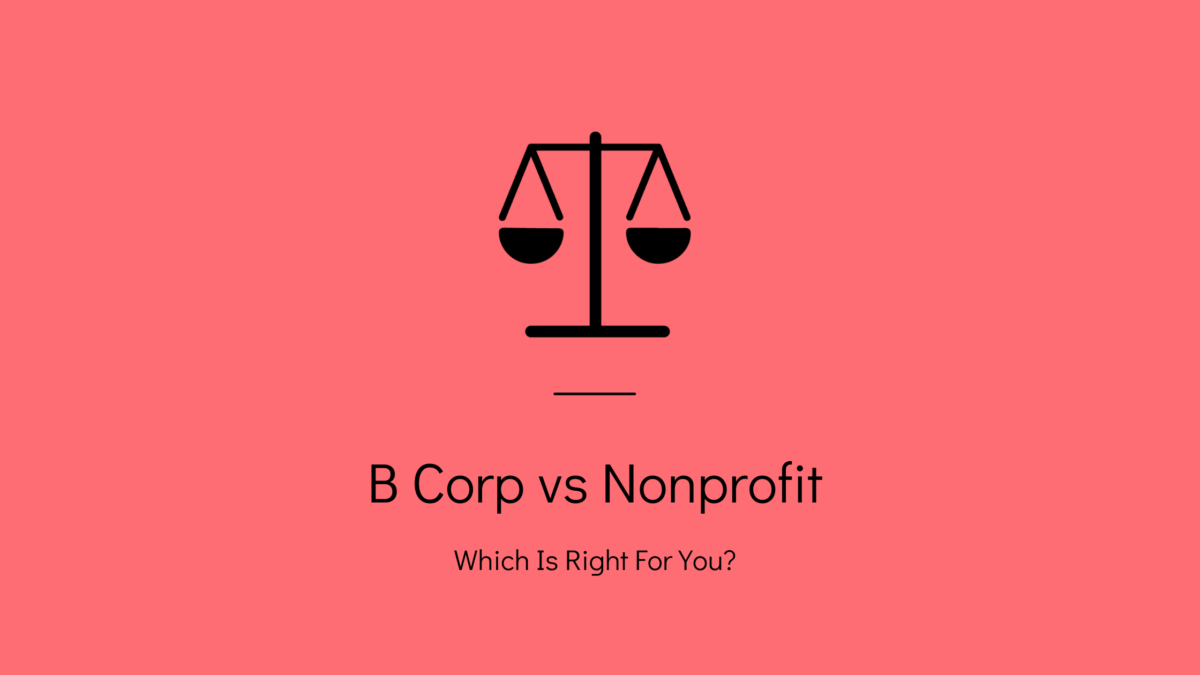
Prior to 2007, anyone who wanted to set up an organization to do good in the world had one choice: set up a nonprofit.
However, that’s when the founding B Corps were certified. As companies committed to doing good, this created some understandable confusion.
Today there isn’t a one-size-fits-all blueprint for organizations organizations that want to do good. If you’re a social entrepreneur looking to make an impact in the world or in your community, you may have considered setting up either a nonprofit or a Certified B Corporation, also known as a B Corp. But what are the differences between the two?
In this article, we’ll discuss how these two types of entities differ and the strengths and potential drawbacks of each.
What Are the Similarities Between a B Corp & a Nonprofit?
The key similarity between B Corps and nonprofits is that they both seek to create a better world. In pursuit of doing something good, the single-minded focus of profit at all costs takes a back seat.
Understanding this with nonprofits is straightforward – the very name makes it clear that they’re not out to make a profit.
B Corps, however, are for-profit companies. They are generating profits from the products or services that they sell in the open market. What makes them similar to nonprofits is that, unlike traditional companies that are focused on making a profit without consideration for how they impact people and the planet, B Corps are committed to making a profit in a way that does take people and the planet into account.
B Corps are focused on stakeholder governance. Traditionally, in business, companies had to maximize shareholder value, so that the owners who hold shares in the company can generate a profit.
B Corps expand this lens to take into consideration all stakeholders, meaning anyone who has a stake in how that company operates. These can include employees, customers, suppliers, and community members. By taking all stakeholders into account, B Corps are ensuring that their profits do not come at the expense of those who are affected by the company’s actions and operations.
This is similar to what nonprofits have traditionally done. Nonprofits generally have a mission that requires that they act on behalf of one or more stakeholder groups.
What Is the Difference Between a B Corp & a Nonprofit?
Despite the similarities between B Corps and nonprofits, there are fundamental differences.
The first is that nonprofits are not allowed to provide a private benefit to individuals. The organization can earn profits, but it can’t distribute those profits to individuals.
In contrast, B Corps are for-profit companies. As such, the individuals who own or run the company can benefit financially from the company’s activities.
B Corporations are also a fairly new concept in business. In fact, the first B Corps were certified in 2007 by the nonprofit B Lab and there are still only fewer than 10,000 B Corps around the world.
Here are some key differences between B Corps and nonprofits:
- Ownership – Ownership in a nonprofit “is vested the community,” an explicit acknowledgement that the nonprofit exists for a public benefit. B Corporations, as either public or private entities, have owners like any business.
- Funding – Nonprofits generate funds through community outreach, fundraisers, and grants. While they may sell products or services, they must often augment any business revenue generated with other funding sources. B Corps, on the other hand, make money through the traditional means for businesses: through the sale of products and services to the market.
- Taxes – Because nonprofits function as charities, they may be exempt from federal taxes. B Corporations, like other companies, are required to pay federal income tax.
Can a Nonprofit be a B Corp?
B Corporations are often thought of as hybrids between traditional for-profit organizations and nonprofit organizations.
However, the goal of the movement is to harness business as a force for good. B Corp certification is specifically designed to help companies measure, manage, and improve their social and environmental impact.
With its entire focus on supporting a global community of for-profit companies, nonprofits are not eligible to become B Corps.
Take the Next Step to Becoming a Certified B Corp
Are you a socially minded entrepreneur interested in building your business as a B Corp? Please get in touch with us at Cultivating Capital to discuss your goals and let’s get started on your journey as you join the B Corp movement and help make the world a better, more sustainable place.